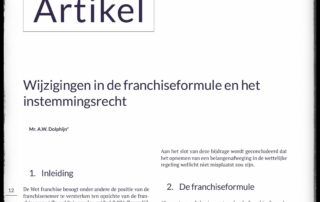Franchise Closing Sale – Who Gets the Sale Proceeds?
The judgment of the District Court of the Northern Netherlands dated October 12, 2016, ECLI:NL:RBNNE:2016:5061 (Administrator/Expert Group and Rabobank) focused on the question whether the franchisor could claim the proceeds of the sale together with the bank with a departing franchisee. The franchisee was in serious payment arrears with the franchisor and the bank. In order to claim the proceeds of the sale and thus to pay off the debt(s), an agreement was concluded. The purpose of this was that the proceeds of the sale would be used to pay the franchisor and the bank. However, the court ruled that the proceeds must be divided among all creditors, given the bankruptcy of the franchisee. The franchisor and the bank will therefore make a mistake.
What was going on? The (group company of the) franchisor had provided financing to the franchisee, whereby a right of pledge was also established on the goods delivered (by another group company). The bank also provided financing. The (group company of the) franchisor and the bank have made agreements between themselves and with the franchisee, on the basis of which a retention of title has been established against the stock. This retention of title would replace the existing right of pledge. The sale brings in a significant amount.
The franchisee also files for bankruptcy and ends up in debt restructuring. If the sale had taken place under the lien, the proceeds would accrue to the franchisor and the bank. In other cases, the proceeds would fall into the estate, which the administrator will then distribute among all creditors. Then the franchisor, just like the bank, would (probably) receive much less.
The franchisor and the bank are therefore only fully entitled to the sale proceeds if the sale must be regarded as an exercise of the right of pledge. There must therefore be a right of pledge in respect of which the pledgee is authorized to proceed to enforcement and an agreement showing that the pledgee and pledgor have agreed that the pledgee sells the pledged goods in the context of the execution of that right of pledge. Because the right of pledge was replaced by a retention of title in a further agreement, precisely in the context of the clearance sale, there was no exercise of a right of pledge. An appeal to the sale proceeds on the basis of the retention of title also does not apply. The retention of title no longer existed, precisely because it expires with the sale.
The conclusion is that the franchisor and the bank have no claim to the sale proceeds, but the administrator can include it in the estate for the settlement of all joint creditors. Franchisors would do well to make sure that clearance agreements are legally sound.
mr. AW Dolphijn – Franchise lawyer
Ludwig & Van Dam Franchise attorneys, franchise legal advice. Do you want to respond? Go to dolphijn@ludwigvandam.nl .

Other messages
Mitigation of fine due to ‘dominant position’ of franchisor
Mitigation of fine due to 'dominant position' of franchisor ...
It is a non-competition clause at the end of the lease
In the judgment of 26 March 2024, ECLI:NL:GHSHE:2024:1035, the Court ...
Looking ahead: Bottlenecks at the end of the franchise agreement
Of course, everyone starts a collaboration with good courage. But ...
Not just a successful appeal to incorrect forecasts
Not just a successful appeal to incorrect forecasts Introduction ...
Changes to the franchise formula and the right of consent
An article by Mr. was published in the leading legal ...
The National Franchise podcast
Guests on the National Franchise podcast are: Theodoor Ludwig ...







